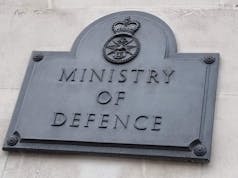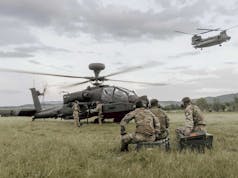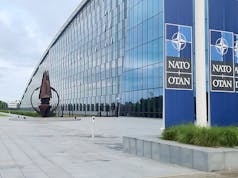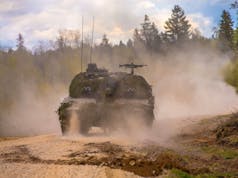The UK defence industry is struggling to meet increased production demands due to shortages in skilled workers, key materials, and lengthy security clearance processes, according to industry leaders giving evidence to the Defence Select Committee.
The session on 4 March 2025, part of the Committee’s inquiry into the UK’s contribution to European security, heard concerns over the pace of industrial mobilisation amid rising global tensions and increased defence spending commitments.
Julian David, CEO of techUK, told MPs that the Ministry of Defence (MOD) and broader UK defence sector are failing to address the growing need for digital skills, which are essential for modern warfare.
“Digital skills are increasingly going to be a huge part of any defence deployment or defence capability that we have. That is really not being addressed in the current MoD and broader British defence forces environment,” he warned.
David emphasised that defence careers need to be made more attractive, particularly in technology sectors such as communications, battlefield logistics, and space capabilities.
Andrew Kinniburgh, Director General of Make UK Defence, reinforced the concern, stating that the UK defence sector is in a long-term skills crisis, with fewer young people pursuing defence-related apprenticeships.
“Every member survey we have done for the last 10 years shows skills shortages as the top issue,” he said.
Kinniburgh highlighted that apprenticeship funding structures are inadequate, making it difficult for companies to invest in future talent.
“It costs us £35,000 to train one apprentice, but the apprentice levy only allows us to recover £27,000. We lose money on every single apprentice.”
Material Supply Chain and Industrial Resilience Challenges
MPs also questioned witnesses on the availability of critical raw materials needed for rapid expansion in defence manufacturing.
Julian David pointed out that key electronic components, particularly semiconductors, remain a major vulnerability.
“We all remember when car manufacturers had to stop production because they couldn’t get chips. The same issue applies to defence—we need to ensure a stable and secure supply,” he said.
He warned that the concentration of semiconductor production in Asia—particularly near China—poses a serious strategic risk.
Andrew Kinniburgh noted that while raw material shortages have eased since the post-COVID disruption, supply remains fragile. He criticised the MOD’s failure to prioritise British-made materials, particularly UK-produced steel.
“The Defence Infrastructure Organisation, which builds facilities for the MOD, has no policy to buy UK steel. It just spot-buys on the open market, which is a huge risk to resilience,” he argued.
Security Clearance Delays Hindering Defence Innovation
Another major issue raised was the slow and fragmented security clearance system, which prevents SMEs and new suppliers from quickly contributing to defence projects.
Julian David criticised the lack of a unified clearance system across government agencies, noting that companies have to apply separately for MOD, Home Office, and Foreign Office clearances, delaying innovation and procurement.
“If you are not already engaged with us, we don’t have a way to give you a fast path to security clearance,” he said.
Kevin Craven, Chief Executive of ADS, warned that clearance delays were a serious obstacle to increasing defence production capacity.
“To increase the workforce by 10% probably requires a minimum of two or three years,” he said.
Craven revealed that his organisation had to step in to manage clearances directly, making it the fifth largest private supplier of security clearances to the MOD.
“We’ve gone from managing roughly 200 or 300 security clearances a year to over 7,000 now, taking some of the process work away from the MOD.”
MPs Push for Faster Action
The Defence Select Committee pressed industry leaders on whether the government was moving quickly enough to address these issues.
Derek Twigg MP asked how long it would take to expand the workforce and increase production, highlighting the government’s recent pledge to triple missile production in Belfast.
Kevin Craven responded that the expansion would likely require additional factory shifts rather than an immediate scaling up of infrastructure.
“Tripling missile production will require extra shifts at the Belfast site, but expanding capacity further will take longer,” he explained.
Twigg also pressed witnesses on whether security clearance delays were a minor issue or a major problem.
Craven’s response was blunt:
“The length of time to get one is a serious problem.”














Hopefully the new labour government plan to dumb down academy schools will be scrapped. I liked those STEM Academies linked to blue chip UK engineering firms. We need more of them.
Which ever way one views what is before us, getting out of this precarious situation in national defence gets more problematic by the day. The delusory ‘peace dividend’, selling off or closing down strategic national industrial capacity, an education system in unmanaged decline and our native cultures pilloried nightly on national broadcasting. Now our ‘Special Relationship’ gets a quicky divorce no one saw coming and we are on the street with nowhere to go. Does anyone have a cunning plan to share?
Companies saying that they are losing money on every apprentice, was it not ever thus?
Company takes a hit on the training of new staff with hope that once up to speed then that colleague makes them a profit in future years.
Uk industry has been relying too much on ready trained staff from abroad. Business needs to invest in its people.
We used to run a massive training scheme.
Mostly for the benefit of our competitors.
Because we were investing in training we couldn’t match wages. So we stopped training to hoover the workers up.
Very sad but there is loyalty.
* Very sad but there is *no* loyalty.
I remember Thatcher scrapping the Industrial Training Boards which levied each industrial sector which then used the proceeds to subsidise apprentices on the pretext that Industry would naturally do it for themselves. British short term thinking and longer term strategy never made good bedfellows. That said, successive governments have had 40 years to correct this situation and haven’t. Now in the face of overwhelming certainty perhaps it will be corrected. Sadly it’s the British way.
The problem is companies keep treating employees like apprentices long after they’ve been trained, so they going looking for other employers who will treat them better and pay fairer wages.
This. The only reason the apprentice moves on is recieve a proper wage. Pay them the same the firm down the road and they’ll stay.
Clearances not surprising, they had already eked out routine re-vetting to save money.
Surprise surprise HMG government 🙄 🇬🇧
How is industry supposed to maintain skills when it has no orders? TOBA funnelled money to BAE to keep warships building going while politicians and senior officers argued about specifications. No orders for tanks so BAE closed down Newcastle and Leeds. Now UK is having to rebuild those skills but unless procurement changes, there will be another famine after feast.
UK must define its core defence needs free of the nonsense of global Britain and expeditionary warfare. It’s not very difficult to do and once done we know the minimum forces we have to fund over decades. The start in 2010 of publishing a defence 10 year equipment plan exposed the serious underfunding of over ambitious plans. The RN was the biggest culprit in pressing the case for the largest carriers in our history, relying on a single very expensive aircraft over whose development we have little control. New SSNs were over specified compared with their predecessors. Vast sums have been spent on these programmes which so far have not delivered value for money. SSNs alongside for years, carriers with mechanical issues and too few aircraft.
The RN must be forced to be more realistic and stop trying to match in quality the USN. We need more affordable platforms, adaptable for future weapons, in continuous build over extended periods. To maintain an escort fleet of 20 requires just one new ship a year. Similarly, low rate production of combat aircraft and AFVs would save costs and preserve skills.
Anything related to defence quoted in 2010 might as well be flushed down the toilet as they have the two clowns names attached; Cameron and Osborne who instead of addressing the problems in defence caused by underfunding and two wars actually made them worse by reducing funding yet further.
The carriers are a good example of just poor decision making with the build slowed down to meet arbitrary yearly spending constraints that added £1Bn to their cost. The original idea was to initially embark harriers and slowly introduce the F35 as they became available but in 2010 they were scrapped prematurely. Italy and USMC have done precisely this. We therefore had aircraft to embark but choose to scrap them.
Please remember that two large carriers have replaced three smaller vessels and arguably with a minimal increase in crewing should be relatively cost effective in service. As for mechanical issues the QE’s have suffered mechanical issues but so have the Ford class and the Invincible’s had significant issues with propellers and gearbox fires early in there service lives. Despite what the MSM might say in sensationalist articles they are hardly basket cases.
The procurement of the Astute class has been disastrous and far too slow but when you lose key skills because of a lack of orders it is a huge undertaking to rebuild the capability, which adds further cost. In addition only 7 subs were ordered when 8 could have been delivered over the same period for around the same cost but the MOD only wanted 7. When you want small numbers of high end equipment you pay a premium for the privilege.
The SSNs are simply alongside because the two defence experts named above deferred investment in both
Devonport and Faslane eventually leading to a lack of docking facilities to undertake routine refit and maintenance cycles. This has been so serious it has jeopardised the CASD and required at eye watering cost the unplanned refuelling of Vanguard.
But these two idiots weren’t finished they then deferred ordering the Type 26 and the FSSS, which has cost a fortune with the LIFEX refits of the type 23s. Whilst the premature scrapping of Fort Victoria’s sister ship in 2010 has meant just one solid stores ship is available, which is not ideal when vessels are getting towards the end of there useful lives and maintenance requirements inevitably increase.
Sorry but ultimately the MOD and political leaders (Tory and Labour) are the decision makers and not those in uniform and in the last 25 years they have been severely wanting.
Shades of the 1915 shell crisis is brewing…
https://en.m.wikipedia.org/wiki/Shell_Crisis_of_1915
Where’s David Lloyd George?
The situation with clearances has been ridiculous for years. Different vetting organisations for MOD, Home Office, individual police forces etc. And of course the clearances aren’t generally transferable either. And then DBS checks are a separate thing again. Nothing’s ever done about it.
Well how about employing people like me who at 61 are considered too old to write software despite doing it for 40 years?
I think that is called Age Discrimination and is unlawful.
Difficult to believe the industry has only just woken up to skills shortages in engineering.
That started virtually when I was an apprentice in 1968. Engineering skills have been on the decline ever since.
I could get any number of design jobs in the early 70’s but bit by bit the employers were shrinking: British Aerospace, Plessy, Rank Xerox, Marconi GEC, Marconi Elliot avionic systems, DeHavilland, Hawker Siddeley Dynamics, Racal Engineering and many more, most have gone to the wall or moved overseas.I
Glad I’m retired!